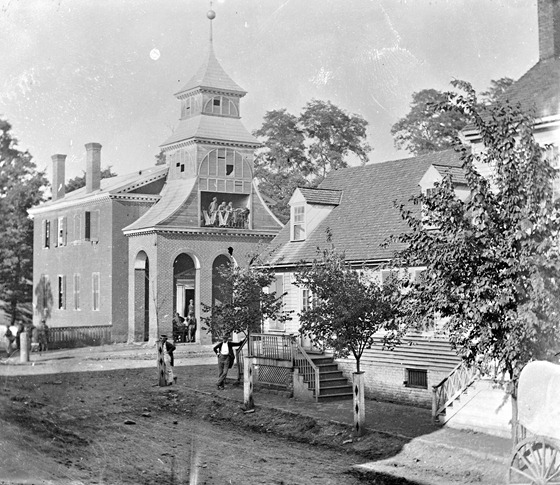August 29, Clinton, La.
Noah’s duck has found another resting-place! Yesterday I was interrupted while writing, to pack up for another move, it being impossible to find a boarding-house in the neighborhood. We heard of some about here, and Charlie had engaged a house for his family, where the servants were already settled, so I hurried off to my task. No easy one, either, considering the heat and length of time allowed. This time I ate dinner as I packed, again. About four, finding Miriam did not come to Mr. Elder’s as she promised, I started over to General Carter’s with her clothes, and found her just getting into the buggy to ride over, as I arrived warm, tired, hardly able to stand. After taking her over, the General sent the buggy back for Mrs. Carter and myself, and soon we were all assembled waiting for the cars. At last, determining to wait for them near the track, we started off again, General Carter driving me in his buggy. I love General Carter. Again, after so many kind invitations, he told me he was sorry we would not remain with him; if we were content, he would be only too happy to have us with him; and spoke so kindly that I felt as though I had a Yankee ball in my throat. I was disposed to be melancholy anyway; I could not say many words without choking. I was going from the kindest of friends to a country where I had none at all; so could not feel very gay. As we reached the track, the cars came shrieking along. There was a pause, a scuffle, during which the General placed me and my bird in a seat, while Lilly, Charlie, Miriam, mother, five children, and two servants, with all the baggage, were thrown aboard some way, when with a shriek and a jerk we were off again, without a chance of saying goodbye, even.
I enjoyed that ride. It had but one fault; and that was, that it came to an end. I would have wished it to spin along until the war was over, or we in a settled home. But it ended at last, to Jimmy’s great relief, for he was too frightened to move even, and only ventured a timid chirp if the car stopped, as if to ask, “Is it over?” Nothing occurred of any interest except once a little boy sent us slightly off the track, by meddling with the brakes.
Landed at sunset, it is hard to fancy a more forlorn crew, while waiting at the depot to get the baggage off before coming to the house. We burst out laughing as we looked at each lengthened face. Such a procession through the straggling village has hardly been seen before. How we laughed at our forlorn plight as we trudged through the hilly streets, —they have no pavements here, — looking like emigrants from the Ould Counthry, as we have watched them in New Orleans!
At the house we found Tiche laid up. The loaded wagon, with its baggage, four mules, three grown servants, and four children, was precipitated from a bridge twenty-five feet high, by the breaking of the before-mentioned causeway, and landed with the whole concern in deep water below. Wonderful to relate, not a life was lost! The mattress on which the negroes remained seated floated them off into shallow water. The only one hurt was Tiche, who had her leg severely sprained. The baggage was afterwards fished out, rather wet. In the mud next morning (it happened late at night), Dophy found a tiny fancy bottle that she had secreted from the Yankees; a present from Clemmy Luzenberg, it was, and one of two things left in my curiosity shop by the Yankees.
After seeing everything in, we started off for the hotel, where we arrived after dark, rather tired, I think. Not a comfortable house, either, unless you call a bare, unfurnished, dirty room without shutter or anything else, comfortable; particularly when you are to sleep on the floor with four children and three grown people, and a servant. After breakfast we came here until we can find a place to settle in, which Mr. Marsden has promised to attend to for us. It is rather rough housekeeping yet, but Lilly has not yet got settled. Our dinner was rather primitive. There was a knife and fork to carve the meat, and then it was finished with spoons. I sat on the floor with my plate, and a piece of cornbread (flour not to be bought at any price) and ate with my fingers — a new experience. I found that water can be drunk out of a cup!
Ouf! I am tired!










